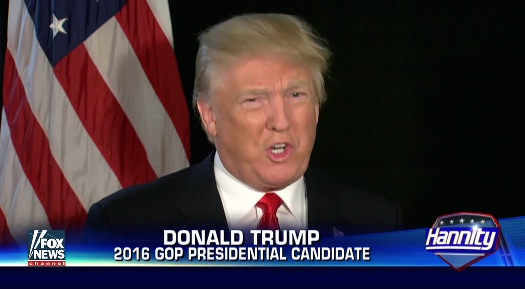I’ve tried to steer clear of the debate (if you call it that) over Donald Trump’s foreign policy speech in Washington yesterday — I have to get a book done — but the torrents of dismissals that have rained down upon it has driven me to write something. If you don’t know what I am talking about, look at Clinton operative David Brock’s collection of these responses charging that Trump’s speech was “pathetic” and “not exactly coherent.”
I am not driven to write in defense of Trump, whom I am not supporting for President, nor of what he espouses, but of the sheer arguability and coherence of the principles underlying his speech. I won’t say they’re right, but I will say they are coherent and arguable and also preferable to those that govern, say, the views of people like Lindsey Graham or publications like the Washington Post that are still unrepentant and unthinking about their enthusiastic support for the Iraq War.
Let’s separate out some of Trump’s campaign bluster from these principles. I am thinking of promises to wipe out ISIS in five minutes, of wildly exaggerated views of America’s weakness, or sheer insults about the intelligence of Presidents or Secretaries of State. Instead I want to focus on a few core assertions:
1. America needs to share the burden of global peacekeeping with its allies. Critics of our foreign policy — on the left and right — have been making this point since Nixon called for the application of Vietnamization to places like the Middle East as well. It was called the Nixon Doctrine. It’s usually accompanied by questions about overreach and about our extensive, and perhaps unnecessary, alliance structures, including NATO. These kind of arguments have been legion since 1989 and are perfectly coherent, whether you agree with them or not.
2. America needs to repudiate the foreign policy espoused by Republican (and Democratic) neo-conservatives that got us into the Iraq War and that, if subsequently pursued, would have probably gotten us into a war with Iran as well. (Am I exaggerating? See the Wall Street Journal column, for instance, by chief Trump critic Eliot Cohen in 2009 saying “There are only two choices Left on Iran: an Israeli or U.S Military Strike or a Nuclear Teheran Soon.”) These policies, as Trump charged, assume that the objective of the United States should be to transform the world into a collection of small and very large American client states, preferably with American institutions, using, if necessary, military force. It’s folly of the highest order.
3. America needs to reset its relations with China and Russia. This position, too, has been common (with variations on what kind of reset) among presidential candidates since at least 1992. I don’t understand our relations with China, but I have believed that the Obama administration – beginning with its having deceived the Soviet Union and China at the United Nations over its intentions in Libya and down through the Snowden affair, the encouragement of a coup in the Ukraine and Obama’s gratuitous snub of the Russians at the Olympics – may have worsened what were already difficult relations. Trump’s stand here is arguable.
4. America needs to put America First. I admit I was taken back by this slogan, which goes back to Pat Buchanan in 1992 and farther still to the anti-interventionist organization led by Charles Lindbergh (and Norman Thomas!) in 1940, but David Frum has reminded us it goes back to Wilson in 1916. Whatever its origin, I don’t buy the facile dismissal of the idea that America should put its interests first, i.e. “don’t we always do that?” There has been a whole set of particular instances where America’s foreign policy has been heavily influenced by lobbies for foreign governments or by lobbies by exiles from foreign government and has adopted as a result (in my view) policies that are not in America’s interest. And there is also a longstanding argument about whether interventions like those in the Balkans in the ‘90s were really in America’s interest, or whether it was in America’s interest to topple Qaddafit in Libya. Those who argue these points want to set a narrower and stricter criterion for what’s in America’s interest. You might disagree, but it’s not an incoherent or redundant position.
Trump’s position, shorn of his bluster and braggadocio, is a version of realism that has been going around Washington for decades. It’s worth discussing not dismissing, even you would like (as I would) to see Trump the Republican nominee dismissed by the voters next November. Or even if you think (as I do) that if Trump were president, he might act according to entirely different and highly destructive and idiosyncratic foreign policy principles.






